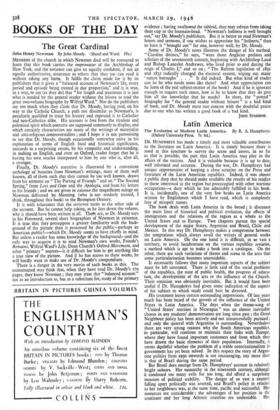BOOKS OF THE DAY
The Great Cardinal
John Henry Newman. By John Moody. (Sheed and Ward. 15s.) MEMBERS of the church in which Newman died will be reassured to learn that this book carries the imprimatur of the Archbishop of New York, and the reviewer can give an equally confident, if not an equally authoritative, assurance to others that they too can read it without taking any harm. It fulfils the claim made for it by its publishers that it gives a " balanced account of Newman's life, every period and episode being treated in due proportion," and it is true, in a way, to say (as they do) that " for length and treatment it is just what is needed by the general reader without the leisure to read the great two-volume biography by Wilfrid Ward." Nor do the publishers say too much when they claim that Dr. Moody, having trod, on his way to the Catholic Church, a path not dissimilar to Newman's, is peculiarly qualified to trace his history and expound it to Catholics and non-Catholics alike. His account is free from the virulent and polemical spirit which converts are supposed commonly to display, and which certainly characterises too many of the writings of materialist and anti-religious controversialists ; and I hope it is not patronising to say that Dr. Moody, though occasionally somewhat naive in his explanation of terms of English local and historical significance, succeeds to a surprising extent, by his sympathy and understanding, in making an English, and even an Oxford, reader forget that he is having his own oracles interpreted to him by one who is, after all, a stranger.
Finally, Dr. Moody's narrative is illustrated by a convenient anthology of beauties from Newman's writings, most of them well known, all of them such that they cannot be too well known, drawn from his sermons on " The Parting of Friends " and on " The Second Spring," from Loss and Gain and the Apologia, and from his letters to his friendsand we are given in extenso the magnificent eulogy on Newman delivered by Manning (who is too tenderly treated, I think, throughout this book) in the Brompton Oratory. It is with reluctance that the reviewer turns to the other side of the account. But he cannot help asking, as he lays down the volume, why it should have been written at all. Theft are, as Dr. Moody says in his Foreword, several short biographies of Newman in existence. It is true that they presuppose a greater familiarity with the back- ground of the picture than is possessed by the public—perhaps an American public?—which Dr. Moody seems to have chiefly in mind. But unless a reader has some knowledge of the background—and the only way to acquire it is to read Newman's own works, Froude's Remains, Wilfrid Ward's Life, Dean Church's Oxford Movement, and other " primary " sources—it is difficult for him to get anything like a true view of the picture. And if he has access to these works, he will hardly want to make use of Dr. Moody's compendium.
There is a danger in the very merits of such books as this. The uninstructed may think that, when they have read Dr. Moody's 270 pages, they know Newman ; they may treat this " balanced account " not as an introduction to, but as a substitute for, study of the primary evidence ; having swallowed the tabloid, they may refrain from taking their cup to the fountain-head. "Newman's holiness is well brought out," say Dr. Moody's publishers. But it is better to read Newman's letters and sermons, if one wishes to appreciate his " holiness," than to have it " brought out " for one, however well, by Dr. Moody.
Some of Dr. Moody's notes illustrate the danger of his method. " Caroline divines," he says, " were those Anglican prelates and scholars of the seventeenth century, beginning with Archbishop Laud and Bishop Lancelot Andrewes, who lived prior to and during the reign of Charles I," and so on •' "The Reform legislation of 1831 and 1832 radically changed the electoral system, wiping out many ` rotten boroughs' . . ." It did indeed. But what kind of reader can he be who needs notes like these? And what appreciation can he form of the real subject-matter of the book? And if he is ignorant enough to require such notes, how is he to know that they do give him all the knowledge that he needs? In short, the " potted " biography for " the general reader without leisure " is a bad kind of book, and Dr. Moody must rest content with the doubtful praise due to one who has written a good book of a bad kind.
JOHN SPARROW.


























 Previous page
Previous page